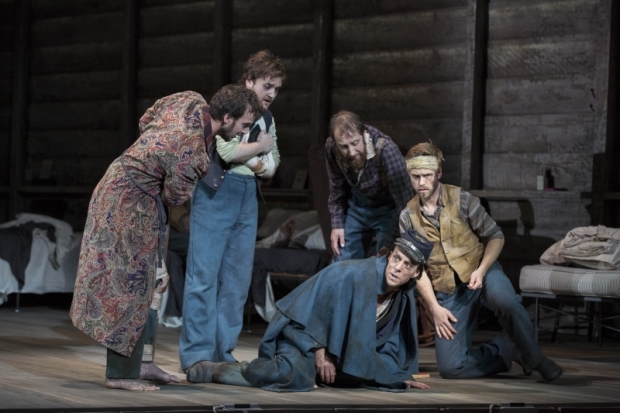Crossing

(© Gretjen Helene Photography)
Crossing, a new opera about Walt Whitman nursing the wounded Union soldiers during the Civil War, evokes the horrors of war at a time of crisis for the poet and the nation that he loved. In its world premiere, the work is noble and profane in subject and brilliantly conceived. It is a testament to Matthew Aucoin, the outsize talent who created the piece with his team of first-rate collaborators. A 25-year-old Harvard grad, he created both the music and the libretto for Crossing, which was directed by Diane Paulus and features a formidable cast. (Crossing was written after Aucoin graduated from Harvard, but it’s his third opera. He wrote two other operas while an undergraduate.)
The opera is based on diaries that Whitman kept about his experiences during the years 1862-1865. The diaries were edited and published in 1875 under the title "Memoranda During the War." The libretto also quotes from Whitman’s poems, notably "Crossing Brooklyn Ferry."
Crossing begins on an empty stage backed by a rough, wooden wall. A handwritten manuscript with certain lines crossed out is projected behind the baritone, Rod Gilfry, who stars as Whitman. Gilfry, a colossus in this role, strides onstage to face the audience and ask-sings, "What is it then between us?" This manner of questioning sets up the dichotomies that Whitman and Aucoin explore: What is the relationship between actor and audience, between the individual and humanity? How can one man find his place in the continuity that flows between the present and the future?
After the solo, the wall rises on the large, forlorn hospital common room where injured men lie on cots and sit in wheelchairs. Whitman walks into the space and picks up a bucket and a towel to start his rounds of the patients.
Whitman’s internal struggles to suppress his attraction to the men becomes the focus when a a rebel disguised as a Union soldier, John Wormley (tenor Alexander Lewis) bursts in and takes center stage. Whitman is charmed and easily taken in by the younger man’s lies. Wormley seduces Whitman then turns on him, forcing the poet to examine his motives for remaining in this desolate place.
In addition to Gilfry’s authoritive Whitman and Lewis ‘s passionate, engaged Wormley, the mostly male cast comprises 11 members of the choir of ragged soldiers, four dancers, and a riveting bass-baritone Davone Tines as the prophetic Freddie Stowers, an escaped slave fighting on the Union side. The soprano Jennifer Zetlan brings a welcome contrast with her good news in a small but theatrically potent role of the messenger.
Paulus keeps her direction tight, as does Aucoin with his pared-down score, which brims with atonal passages and alternates with hints of melodies that sometimes sound like martial music, other times like a whisper of a spiritual. The succulent movement choreographed by Jill Johnson is arranged in a rhythmic blocking of the dancers into the spaces between the soldiers to represent their memories. One passage for the men has them writhing on their cots in a gestural dance that rides the music. Aucoin conducted A Far Cry, the Boston-based, 26-member chamber orchestra in the pit.
The actors are starkly outlined in white light and shadows devised by lighting designer Jennifer Tipton. Finn Ross’ ever-changing projections produce a gripping stage picture on the Tom Pye’s set that surrounds the desperate and homesick men trapped by their wartime injuries.
Aucoin has parsed Whitman’s poems down to their essence, highlighting words like "love," "alone," and "soul." By the end, the author-composer has wrapped themes about longing and acceptance in issues that transcend time, place, and specific history. Crossing stands as an achievement in 21st-century opera that makes us eager for works to come from a prodigiously gifted young man on the rise.











